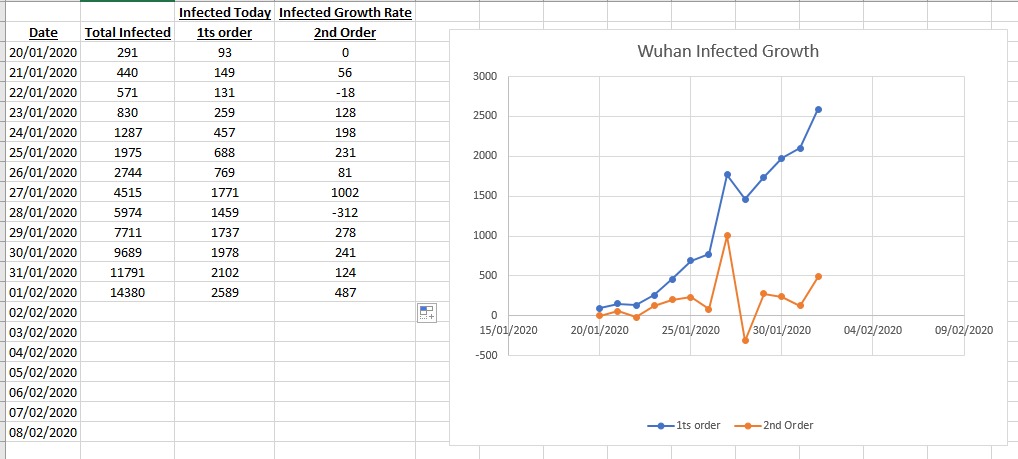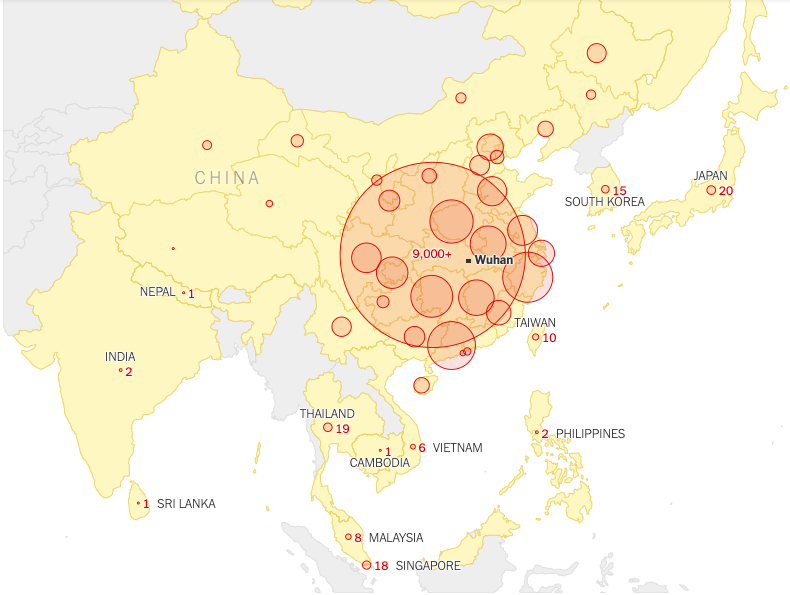SHARES

Coronavirus Spread latest Update – Feb 2 2020
As the coronavirus spreads all over in China, the death toll climbs past 300 and almost 15,000 cases detected. Authorities have confirmed overnight, 1,921 cases at the epicentre of the outbreak, Hubei. This makes a total of 9,074 cases in Hubei alone or 60+% of total infections in China. Altogether China reported more than 2000 new cases on Feb 2.
World Health Organisation reported on Sunday (Feb 2) the first death outside of China, in the Philippines. He was a 44-year-old man from Wuhan, the second case of coronavirus in the Philippines among travellers from China. He passed away later on 1 February 2020. “This is the first reported death outside China,” Rabindra Abeyasinghe, the WHO representative to the Philippines, in a press release.
Coronavirus Spread: How contagious is it? When are people contagious?
Dr Gabriel Leung, public health specialist at the University of Hong Kong says the average person will infect 2-3 people. With such an infection rate, the epidemic would double in size every six days. Scientists using computer modelling has estimated 7 days ago, that the number of infected people in Wuhan alone surpasses 75000. It it probable that there are more than a hundred of thousands cases outside Wuhan, in China.
Meanwhile on February 1, the Shenzhen Health and Medical Commission released a message that researchers detected the coronavirus ((# Viral RNA positive #) in the stool of patients. Based on their experience with SARS, coronavirus research experts said the presence of live viruses indicates that the fecaes are contagious. Therefore as a good hygiene practice, cover toilets before flushing to limit possible spread of all microbes.
Death rate still unknown
During the SARS epidemic, the fatality rate was 11 per cent of cases, and so far the Wuhan virus has killed 2.3 per cent. However, 96 per cent of infected people haven’t yet either died or recovered, so the mortality rate is not yet established. Dr Leung’s team at the University of HongKong estimates that the death rate could be as high as 14 per cent.
Likewise, other epidemic scientists modelling the numbers also suspect that there are many misses on a large number of cases. Leung told journalists this week “there are probably 25,000 sick and another 19,000 incubating the virus just in Wuhan, the origin of the outbreak.” By comparison, MERS has caused only 2499 cases with 780 deaths since the outbreak in 2012, whilst SARS sickened 8000, and 774 died in its global rampage in 2003, .
Fisman, a researcher finds in numerous cases, one infected person has transmitted the virus to far more than two people. One patient infected 14, many of them health workers. Such “super-spreader” events are typical of both SARS and MERS, said Neil Ferguson at Imperial College London earlier this week.
Is it safe to travel to China?
Many health authorities worldwide have issued a level 4 travel advisory telling people not to travel to China. China has closed cities, such as Wuhan, to travellers
Travellers who need to go should:
- Avoid contact with sick people.
- Avoid animals, animal markets, and products that come from animals.
- Wash their hands often with soap and water, or use an alcohol-based sanitizer if that’s not available.
- Seek medical care right away for a fever, cough, or difficulty breathing. Disclose your travel history.
WHO – Novel Coronavirus (2019-nCoV) advice for the public
WHO’s standard recommendations for the general public to reduce exposure to and transmission of a range of illnesses are as follows, which include hand and respiratory hygiene, and safe food practices:
- Frequently clean hands by using alcohol-based hand rub or soap and water;
- When coughing and sneezing cover mouth and nose with flexed elbow or tissue – throw tissue away immediately and wash hands;
- Avoid close contact with anyone who has fever and cough;
- If you have fever, cough and difficulty breathing seek medical care early and share previous travel history with your health care provider;
- When visiting live markets in areas currently experiencing cases of novel coronavirus, avoid direct unprotected contact with live animals and surfaces in contact with animals;
- The consumption of raw or undercooked animal products should be avoided. Raw meat, milk or animal organs should be handled with care, to avoid cross-contamination with uncooked foods, as per good food safety practices
by Wong Mei Chan
View all articles by Wong Mei Chan.






